 |
| |
News | Events | Commentaries | Publications
|
News
|
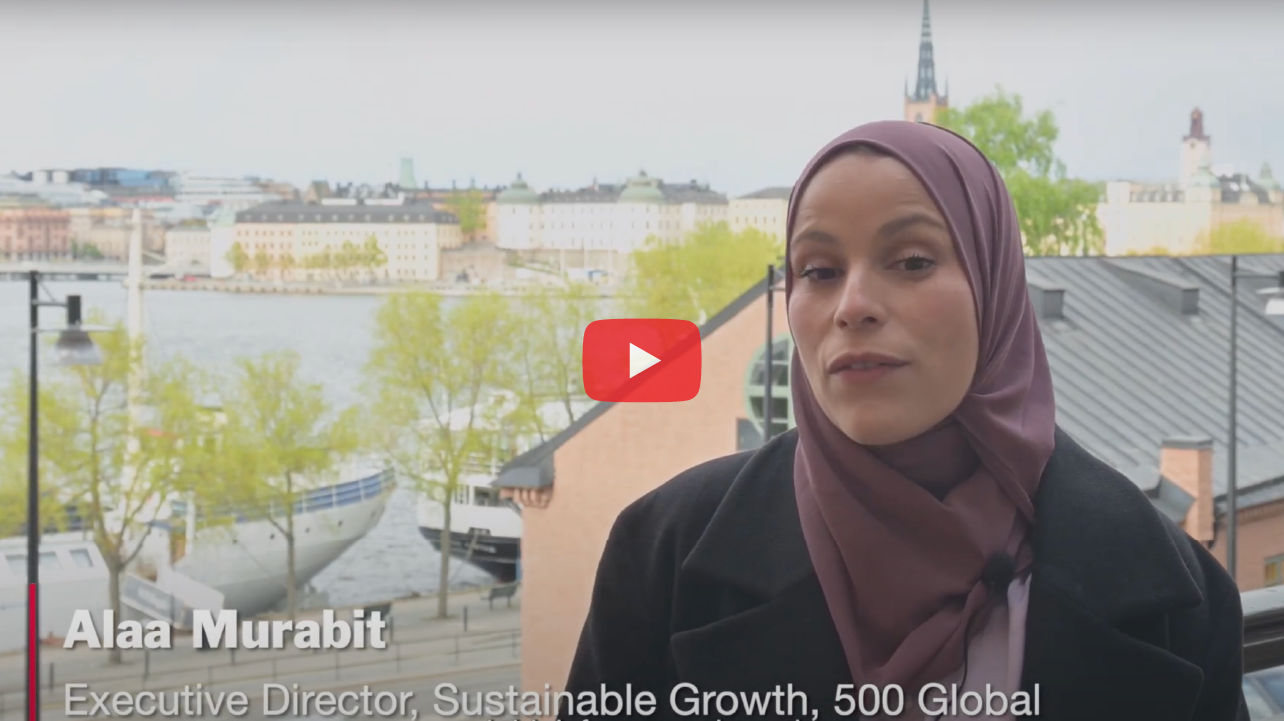 |
New video series—The Future of Conflict Resolution and Peacebuilding
In July, SIPRI released a series of video interviews with a group of peacebuilding experts and practitioners who offer their insights into the current challenges facing conflict resolution and peacebuilding. Filmed at the 2025 Stockholm Forum on Peace and Development, the interviews draw on the various backgrounds and experiences of the interviewees. The diversity of the group brought to light different issues, but a unifying thread linking the interviews is the rising uncertainty around peacebuilding.
Read more | Watch the playlist
|
|
 |
New Spotlight Interview: Dr Azza Karam—President of Lead Integrity
As part of the recent SIPRI event ‘Leadership and Human Security at a Time of War’, SIPRI interviewed Dr Azza Karam, President of Lead Integrity and former Secretary General of Religions for Peace. In the interview, Karam reflects on the absence of genuine leadership in today’s world, the importance of interdependent and courageous leadership, and the ways communities across borders are taking action where institutions fall short. She also discusses why younger generations shaping new forms of leadership remain a source of hope for the future.
Watch the Spotlight Interview
|
|
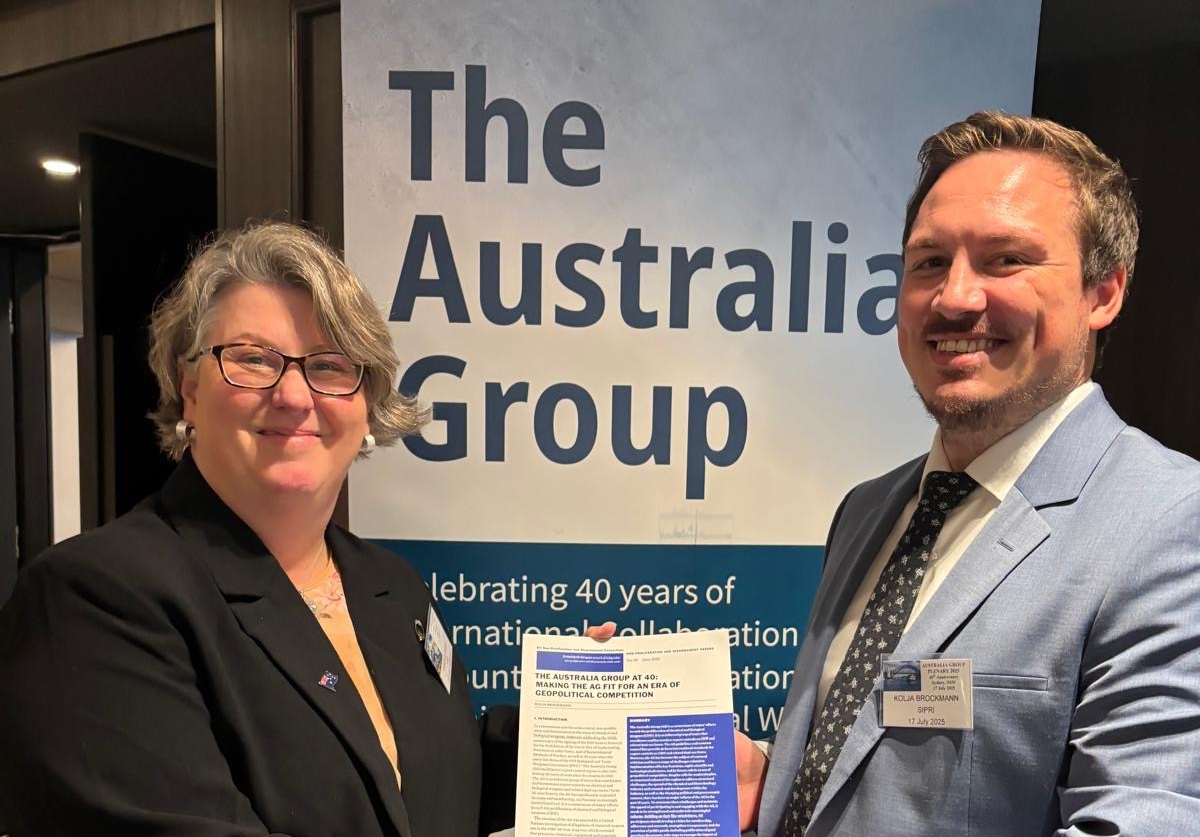 |
SIPRI expert briefs Australia Group at 40th anniversary plenary
On 17 July, Kolja Brockmann, Senior Researcher with the SIPRI Dual-use and Arms Trade Control Programme, briefed the plenary meeting of the Australia Group (AG) multilateral export control regime in Sydney on the occasion of its 40th anniversary. Brockmann presented findings and recommendations from his recent policy paper, ‘The Australia Group at 40: Making the AG Fit for an Era of Geopolitical Competition’, published in the EU Non-Proliferation and Disarmament Consortium (EUNPDC) paper series.
Read more | Read the EUNPDC report
|
|
 |
SIPRI brings responsible innovation into focus at global AI summit
On 8 July, SIPRI took part in the AI for Good summit in Geneva. Jules Palayer, Researcher in the SIPRI Governance of AI Programme, spoke about the risks that civilian AI technology can pose to international peace and security. The presentation built on insights from a joint initiative on responsible AI innovation from SIPRI and the United Nations Office of Disarmament Affairs (UNODA). The initiative also launched a handbook designed to equip AI educators, students and practitioners with the skills to innovate responsibly.
Read more | Read about the SIPRI–UNODA initiative | Explore the handbook
|
|
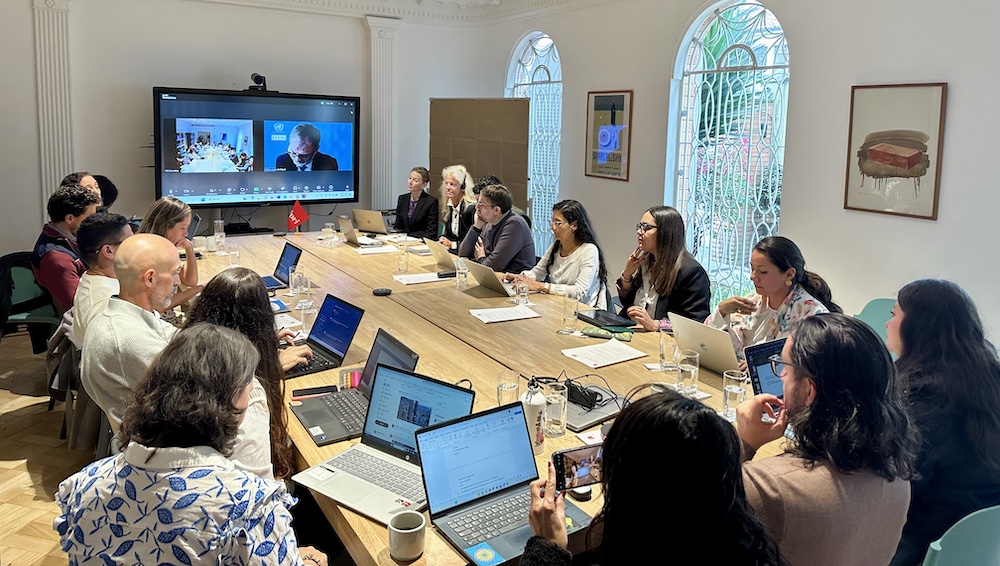 |
SIPRI co-hosts policy events on climate justice in Colombia
On 13–14 August 2025, SIPRI co-hosted a series of meetings in Bogotá, Colombia. The events brought together Colombian policymakers, regional specialists and civil society groups. Aiming to gather feedback for the Latin American Regional Working Group—a collaboration between SIPRI, the Friedrich Ebert Foundation’s Colombia office (FESCOL) and the Swedish International Agricultural Network Initiative—the events focused on the connection between armed conflict, land-use change and climate justice.
Read more
|
|
|
Upcoming events
|
Report launch: Bias in Military AI and Compliance with International Humanitarian Law
29 August 2025 | 14.00
SIPRI will host a virtual event to launch the report ‘Bias in Military AI and Compliance with International Humanitarian Law’. To support efforts to better understand and address the risks posed by bias in military AI, the report unpacks the nature of bias in military AI, explores the challenges it poses to compliance with international humanitarian law and discusses measures that states can take to address it. The virtual launch provides an opportunity for the public to gain insights into the report’s findings and engage directly with experts on military AI.
Read more | Register
|
|
|
Recent events
|
Leadership and human security at a time of war
20 August 2025
On 20 August, SIPRI hosted a diverse group of leaders in Stockholm for a conversation on people-centred approaches to security, their potential to address systemic challenges and the urgent need for new ideas and partnerships in pursuing peace, protecting civilians and preventing conflict.
Read more
|
|
SIPRI convenes workshop on the AI–nuclear nexus
16–17 June 2025
On 16–17 June, SIPRI held a two-day workshop on the theme ‘Priorities at the AI–Nuclear Nexus’, as part of a research project funded by the German Federal Foreign Office. Discussions centred on the ways in which AI is being integrated into nuclear and conventional systems, the implications for nuclear stability, and the importance of maintaining human involvement in decision-making at the AI–nuclear nexus.
Read more
|
|
|
|
|
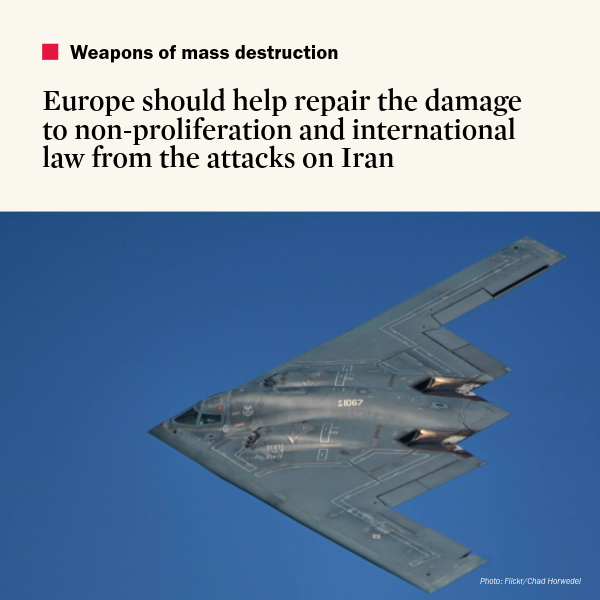 |
Europe should help repair the damage to non-proliferation and international law from the attacks on Iran
European leaders’ responses to the Israeli and United States attacks against Iranian nuclear facilities in June were striking for both their muted tone and their apparent acceptance of violations of international law. European countries have provided arms and political support to Israel in Gaza—and seem to have relinquished defence of international law once again in the war in Iran, SIPRI experts write in this essay published in June, urging leaders to change approach and facilitate a diplomatic exit from the situation. However, in order to do this with credibility, they need to revise their position by insisting that the USA and Israel adhere to international law—and take all steps to ensure that aggression by nuclear-armed states against a non-nuclear weapon state is not seen as permissible.
Read the SIPRI Essay
|
|
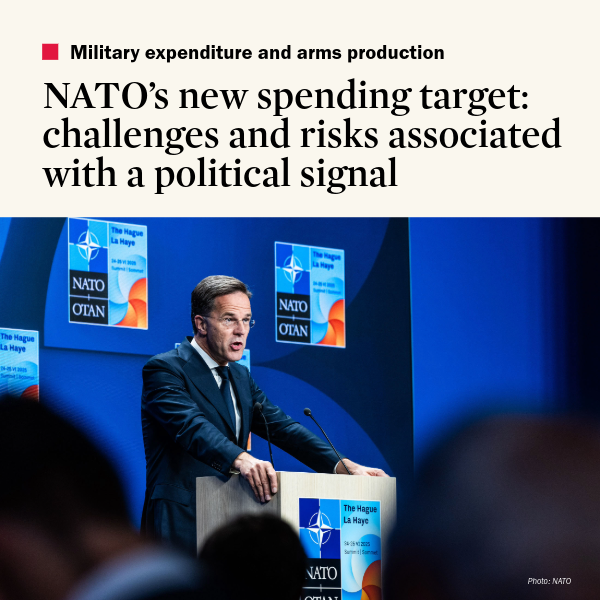 |
NATO’s new spending target: challenges and risks associated with a political signal
In a landmark shift in June, the members of the North Atlantic Treaty Organization (NATO) endorsed a new national spending benchmark: 5 per cent of gross domestic product (GDP) to be invested annually in ‘core defence requirements as well as defence- and security-related spending’ by 2035. The authors of this essay write that the new target sends a strong political message, but at what cost? A NATO alliance that substantially increases its advantage in military expenditure compared to its adversaries may deter aggression, but it also risks accelerating an arms race that overlooks diplomacy and could challenge the ability of domestic defence sectors to absorb the influx of new resources and erode arms control norms.
Read the SIPRI Essay
|
|
 |
SIPRI experts were recently featured in these external outlets:
-
‘Europe’s defence build-up is a climate gamble – here’s how it can course correct’, Florian Krampe, published by the World Economic Forum on 31 July 2025.
-
‘Climate change, environmental peacebuilding, and preventing and countering violent extremism’, Florian Krampe, published in Resilience, Peacebuilding, and Preventing Violent Extremism: A Complex Systems Perspective on Sustaining Peace on 31 July 2025.
-
‘Handbook on Responsible Innovation in AI for International Peace and Security’, Vincent Boulanin, Charles Ovink and Jules Palayer, published by UNODA on 31 July 2025.
-
‘Leading global communication in an era of misinformation’, Stephanie Blenckner, in The Executives podcast on 30 July 2025.
-
‘Tipping cascades between conflict and cooperation in climate change’, Florian Krampe et al., published in Earth System Dynamics on 30 July 2025.
-
‘From welder to prime minister: Leadership, sustainability and AI regulation’, Stefan Löfven, in The Executives podcast on 30 July 2025.
-
‘Somalia’s new climate roadmap as a blueprint for peace’, Ann-Sophie Böhle & Kheira Tarif, published by New Security Beat on 29 July 2025.
|
|
|
Publications
|
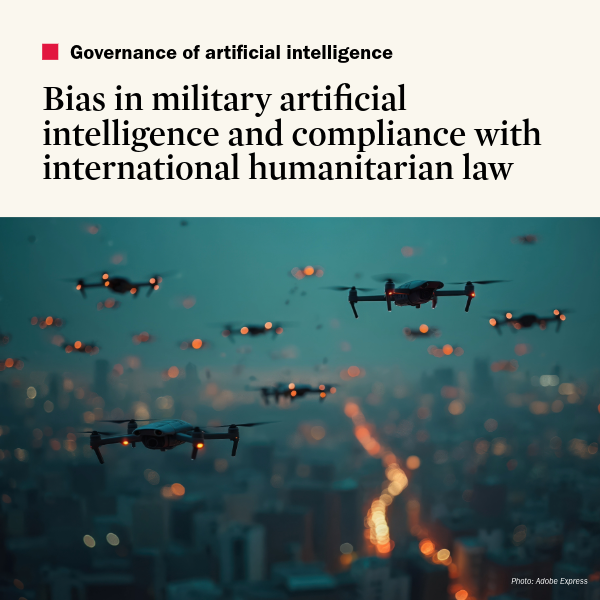 |
Bias in Military Artificial Intelligence and Compliance with International Humanitarian Law
Drawing from insights gained during an expert workshop convened by SIPRI, this report explores the implications of bias in military artificial intelligence (AI) for compliance with international humanitarian law (IHL). The report first unpacks what ‘bias in military AI’ refers to and what its causes are. Then, focusing on bias in AI-enabled autonomous weapon systems and AI-enabled decision support systems used for targeting, it examines the implications of bias for compliance with IHL. Then, it outlines technical, operational and institutional measures to address bias and strengthen IHL compliance. It closes with key findings and recommendations to states involved in military AI policy debates.
Read the SIPRI report
|
|
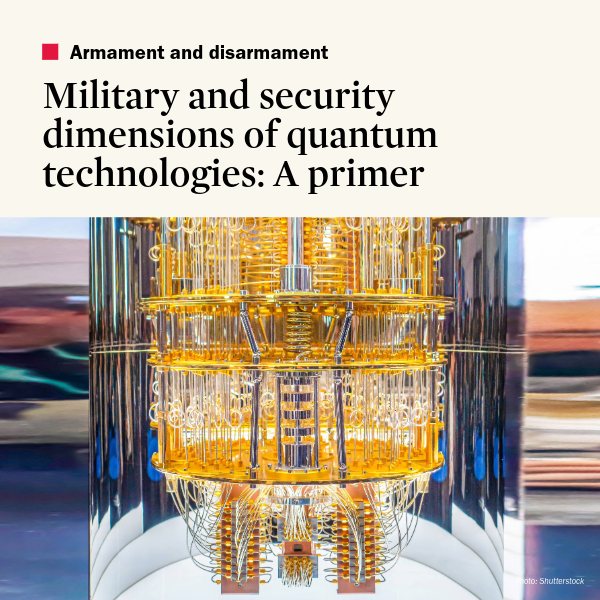 |
Military and Security Dimensions of Quantum Technologies: A Primer
Quantum technologies are advancing rapidly from experimental research into strategic defence and security applications. Given the dual-use nature of quantum technologies—meaning that civilian advances can be rapidly applied to military or intelligence contexts—the potential for strategic asymmetries and the likely future large-scale proliferation of quantum tools, strong policy frameworks, ethical norms and international cooperation are essential. However, multilateral coordination on quantum standards and norms is fragmented. This report therefore provides important background and recommendations aimed at supporting the creation of international ethical, legal and security frameworks that ensure quantum bolsters, rather than undermines, global stability.
Read the SIPRI report
|
|
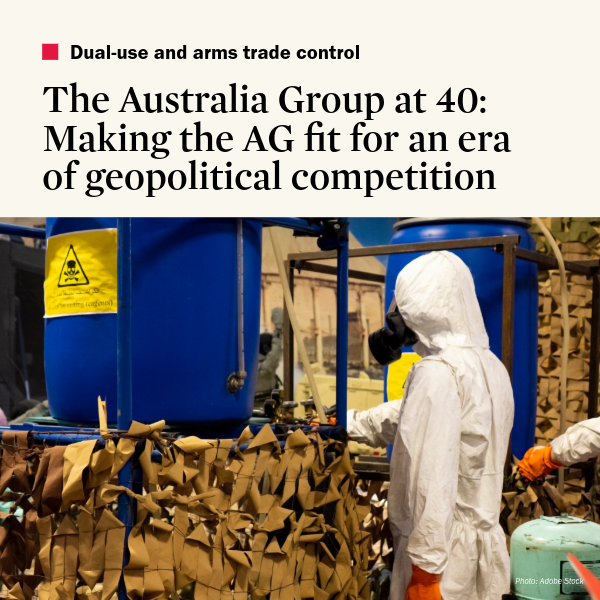 |
The Australia Group at 40: Making the AG Fit for an Era of Geopolitical Competition
The AG is an informal group of states that coordinates and harmonizes export controls on chemical and biological weapons and related dual-use items. However, the AG has become the subject of renewed criticism and faces a range of challenges related to implementation of its key functions, rapid scientific and technological advances, and its future role in an era of geopolitical competition. This paper aims to provide a detailed discussion of current arrangements and practices across the different areas and functions of the AG, identify specific challenges and develop possible steps towards reform.
Read the report
|
|
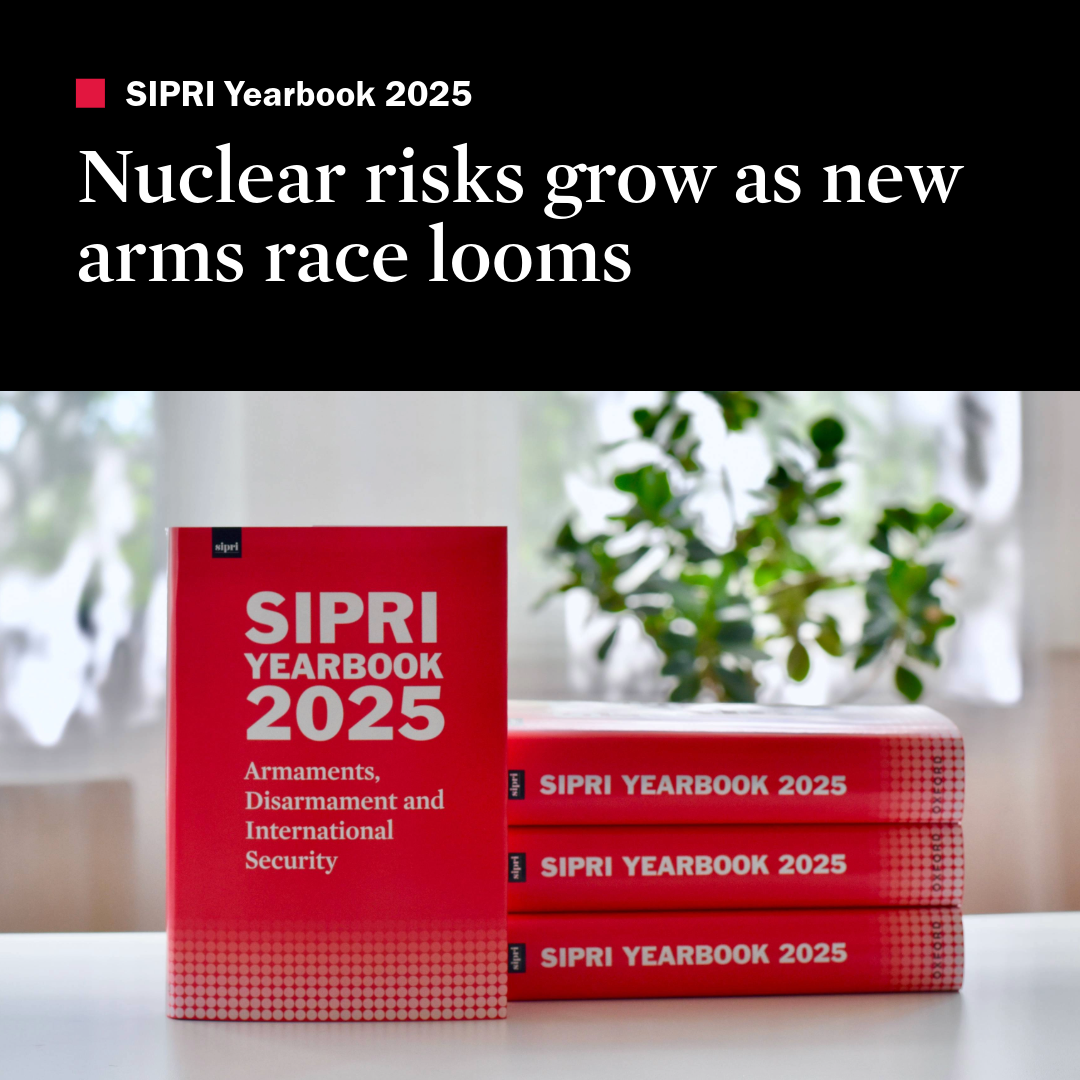 |
SIPRI Yearbook 2025
The SIPRI Yearbook presents a combination of original data in areas such as world military expenditure, international arms transfers, arms production, nuclear forces and armed conflicts with state-of-the-art analysis of important aspects of arms control, peace and international security.
SIPRI Yearbook 2025, which is the latest edition and covers key developments in 2024, includes:
- detailed coverage of nuclear arms control and non-proliferation issues;
- insight on developments in conventional arms control;
- regional overviews of armed conflicts and conflict management;
- in-depth data and discussion on military expenditure, international arms transfers, arms production and world nuclear forces;
- analysis of the growing proliferation of missiles and uncrewed aerial vehicles;
- a focus on international governance of artificial intelligence, cyberspace and space security; and
- comprehensive coverage of efforts to counter chemical and biological security threats.
Browse the contents page | Download the summary (PDF) | Download the sample chapter on world nuclear forces (PDF) | Download the introductory chapter (PDF) | Order SIPRI Yearbook 2025
|
|
|
|
|
Accurate, dependable information is more important than ever. Invest in the facts.
Support SIPRI
|
|
 |
| SIPRI is an independent international institute dedicated to research into conflict, armaments, arms control and disarmament. Established in 1966, SIPRI provides data, analysis and recommendations, based on open sources, to policymakers, researchers, media and the interested public. |
|
|